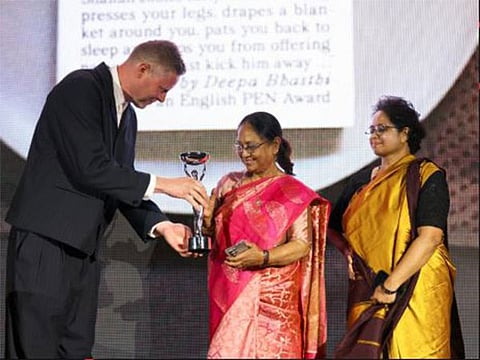Who is Banu Mushtaq, the Indian winner of the 2025 International Booker Prize?
Mushtaq has championed Kannada literature and shares prize with translator Deepa Bhasthi

Banu Mushtaq, the distinguished Kannada writer, lawyer, and activist who won the 2025 International Booker Prize for her short story collection Heart Lamp, began her writing career in her late twenties.
Her works are known for their incisive exploration of women's lives in patriarchal societies, particularly within Muslim communities in southern India. Mushtaq's writing is characterised by its emotional depth, wit, and unflinching portrayal of social realities.
This marks the first time a work in Kannada and a short story collection have received this prestigious award. Heart Lamp was translated into English by Deepa Bhasthi, who shares the £50,000 prize equally with Mushtaq.
"This moment feels like a thousand fire flies lighting a single sky - brief, brilliant and utterly collective," Mushtaq said at a ceremony at the Tate Modern gallery in London. "I accept this great honour not as an individual but as a voice raised in chorus with so many others."
Early life and education
Banu Mushtaq was born in 1948 in Hassan, Karnataka. She was enrolled in a Kannada-language school in Shivamogga at the age of eight, with the condition that she learn to read and write Kannada within six months — a challenge she surpassed by beginning to write after just a few days. Defying societal expectations, she pursued higher education and married at the age of 26.
Activism and social challenges
Since the 1980s, Mushtaq has been actively involved in movements aimed at challenging fundamentalism and social injustices in Karnataka. In 2000, she and her family faced a three-month social boycott due to her advocacy for Muslim women's rights to enter mosques. Her support for Muslim students' right to wear the hijab in schools has been a notable aspect of her activism.
Literary contributions
Mushtaq began her writing career in her late twenties, channeling her experiences and observations into powerful narratives. She has published six short story collections, a novel, an essay collection, and a poetry collection. Her story "Kari Nagaragalu" was adapted into the film Hasina in 2003.
Heart Lamp, Mushtaq's first full-length work translated into English, is a collection of 12 short stories written between 1990 and 2023. The stories delve into the everyday lives and struggles of women in southern India's patriarchal communities, addressing themes such as reproductive rights, faith, caste, power, and oppression.
The translation by Deepa Bhasthi has been lauded for its "radical" approach, preserving the multilingual nature of the original text and authentically conveying the cultural context without exoticism. Bhasthi described her method as "translating with an accent," aiming to maintain the essence of the Kannada language in English.
The International Booker Prize judges, chaired by Max Porter, unanimously selected Heart Lamp for its powerful feminist themes, emotional resonance, and innovative translation. Porter praised the book for its "beautiful, busy, life-affirming stories" that rise from Kannada, interspersed with the extraordinary socio-political richness of other languages and dialects.
Notable stories from the collection
Holy Cow explores the terror of interfaith relationships in a climate of increasing religious intolerance.
Noorah’s House shows how architecture itself reflects and enforces gendered limitations.
The Portrait deals with the alienation of a widow erased from her own family’s memory.
Child Bride gives voice to a girl who sees through a marriage custom that stole her childhood.
The International Booker Prize
The International Booker Prize is awarded annually for a single book translated into English and published in the UK or Ireland. Established in 2005, the prize aims to encourage the reading of quality fiction from around the world and recognises both the author and the translator equally. The £50,000 prize is divided between them, highlighting the vital role of translation in global literature.
Milestone for Kannada literature
Banu Mushtaq's win is a significant milestone for Kannada literature, bringing it to the forefront of global literary recognition. Karnataka Chief Minister Siddaramaiah congratulated Mushtaq, stating: "This is a moment of celebration for Kannada, Kannadigas, and Karnataka."
Mushtaq's journey from a socially boycotted activist to an internationally acclaimed author exemplifies the transformative power of literature. Her stories not only illuminate the lives of marginalised women but also challenge readers to confront societal norms and injustices.
Sign up for the Daily Briefing
Get the latest news and updates straight to your inbox



